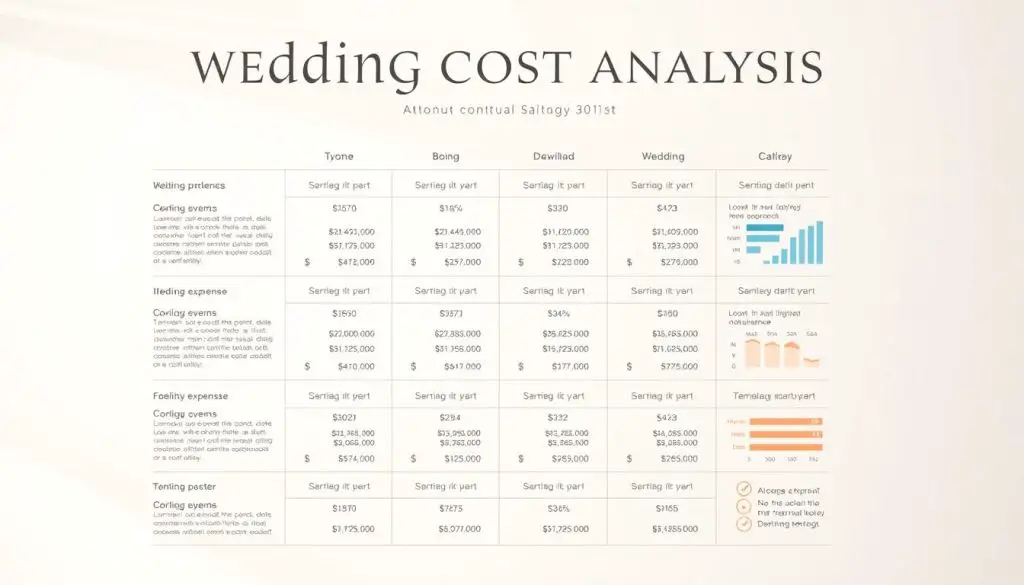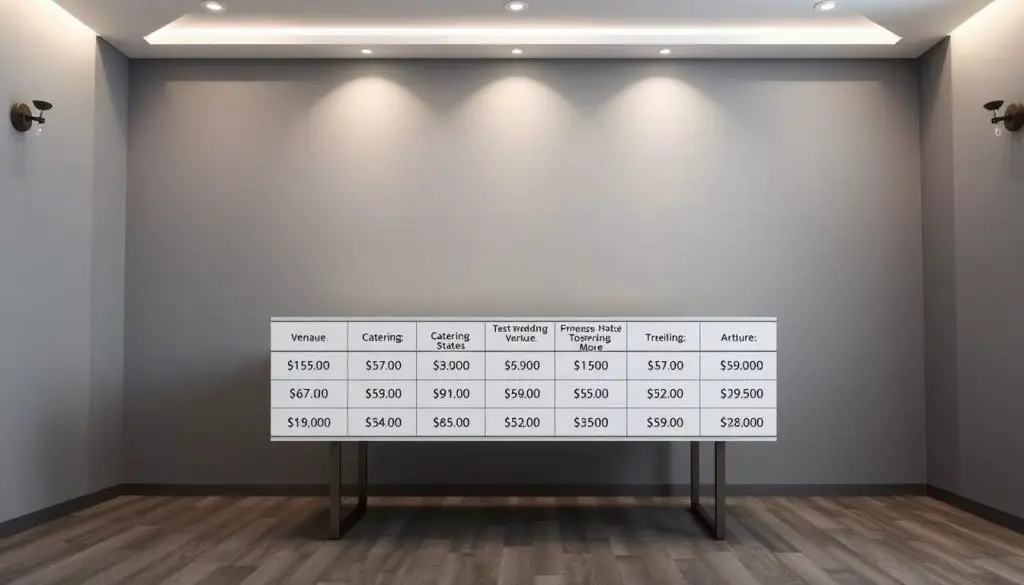In 2023, the average wedding in the U.S. cost over $36,000. This shows just how expensive a wedding can be. Costs like last-minute decor or extra vendor services often add up quickly.
Key Takeaways
- The average wedding expense in the U.S. now exceeds $36,000, per The Knot’s 2023 data.
- Regional costs vary widely, with urban venues often doubling average wedding expenses.
- Hidden fees like gratuities or service charges surprise 60% of couples.
- Proper budgeting reduces debt risks while preserving your dream day.
- Tools like budget templates and cost breakdowns simplify tracking every dollar.
This guide breaks down national averages, hidden costs, and strategies to balance love with financial health. Discover how to plan a celebration that’s both memorable and manageable.
- Key Takeaways
- The Evolution of Wedding Costs Over Time
- Regional Price Variations Across the United States
- How COVID-19 Changed Wedding Economics
- Venue and Catering Costs
- Photography and Videography Expenses
- Attire and Beauty Budgeting
- Music and Entertainment Pricing
- Floral and Decoration Expenses
- Service Fees and Gratuities
- Last-Minute Additions
- Post-Wedding Expenses
- Micro Weddings vs. Traditional Celebrations
- Strategic Guest List Tips
- All-Inclusive Venues vs. DIY Spaces
- Urban vs. Rural Location Costs
- Destination Wedding Considerations
- The Pros and Cons of Wedding Loans
- Using Credit Cards Strategically
- Family Contributions: Navigation Guide
- Types of Wedding Coverage Available
- Average Costs of Wedding Insurance
- Real Claims Examples and Outcomes
- Top Wedding Budget Apps
- Spreadsheet Templates for Wedding Planning
- Budget Tracking Best Practices
Understanding Wedding Expenses in America

When planning a wedding budget, it’s key to know the wedding cost factors at play. These factors include historical trends and regional differences. They help us make smart budgeting choices.
The Evolution of Wedding Costs Over Time
In the 1980s, the average wedding cost was $1,900. By 2023, it soared to over $45,000. This increase is due to changes like better venues and specialized vendors. A 2022 study by The Knot found 68% of couples now spend more on photography than before.
Regional Price Variations Across the United States
| Region | Average Cost | Key Factors |
|---|---|---|
| New York City | $75,000+ | Urban venues, high-end vendors |
| Denver, CO | $32,000 | Scenic locations, moderate labor costs |
| Memphis, TN | $22,000 | Lower rental fees, fewer vendors |
Choosing where to have your wedding can greatly affect your budget. Coastal cities, for example, can add 20% to your wedding cost analysis due to high demand during peak seasons.
How COVID-19 Changed Wedding Economics
- Outdoor weddings rose 40% as safety concerns prioritized airflow
- Hybrid events became standard, adding tech costs but lowering guest limits
- Weekday weddings now save 25-30% compared to Saturdays
A 2023 Brides Magazine survey found 73% of vendors still offer flexible payment plans. This is a result of pandemic adaptations.
How Expensive Is a Wedding: National Averages
The question how expensive is a wedding often sparks curiosity. In 2023, the average wedding expenses in the U.S. totaled around $36,500, according to The Knot’s latest study. But numbers alone don’t tell the full story.
Most couples spend between $25,000 and $45,000, but these figures hide critical details. The average wedding expenses include the venue, catering, attire, and photography. Hidden costs like vendor deposits, permits, or last-minute upgrades aren’t always accounted for in standard reports.
- Median cost: $36,500 (2023 average)
- Median guest count: 100-150 attendees
- Top expense categories: catering (30%), venue (25%), attire (10%)

Median vs. mean matters. Averages can skew higher due to luxury weddings. For example, 10% of couples spend over $100,000, inflating reported totals. Focus on your priorities: eloping in Las Vegas might cost $5,000, while a Napa Valley vineyard event could hit $100,000.
“The national average is a starting point, not a finish line,” says Sarah Lee, a certified wedding planner. “Your budget should reflect your love story, not a statistic.”
Remember: location and guest count are cost multipliers. Urban weddings in NYC or LA cost 30% more than rural venues. Guest lists over 200 attendees add $10,000+ in food, seating, and decor expenses. Track every dollar with tools like Mint or Honeyfund to stay aligned with your goals.
The Wedding Budget Breakdown: Where Your Money Goes
Starting a wedding budget means knowing where your money goes. This guide helps you understand the main costs. You’ll learn how to split your budget wisely.
| Category | Typical Budget Percentage |
|---|---|
| Venue & Catering | 40-60% |
| Photography/Videography | 10-15% |
| Attire & Beauty | 10-20% |
| Music & Entertainment | 5-15% |
| Floral & Decor | 10-20% |
Venue and Catering Costs
Venues and catering take up a big part of your budget. Prices vary from $2,000 to $15,000 for venues. Catering costs $10 to $100+ per guest, especially for sit-down meals.
Outdoor venues are often cheaper than ballrooms. Prices go up in peak months.
Photography and Videography Expenses
Photographers charge $2,000 to $6,000 for a full day. Videographers might cost $1,500 to $5,000. To save, consider edited highlight reels instead of full videos.
Attire and Beauty Budgeting
Bridal gowns cost $800 to $5,000, with alterations adding $200 to $1,000. Groom’s attire ranges from $500 to $1,500. Beauty budgets include trial sessions and touch-ups, totaling $500 to $2,000.
Music and Entertainment Pricing
Live bands cost $2,000 to $5,000. DJs charge $1,000 to $3,000. Photo booths and fireworks add $800 to $2,000 and $500+, respectively. Many couples focus on this after the venue.
Floral and Decoration Expenses
Bouquets cost $200 to $600 each. Centerpieces are $50 to $200. Archways or floral installations are $1,000 to $3,000. Seasonal blooms like peonies or orchids are pricier than others.
Use this wedding budget breakdown to plan wisely. Tools like www.theknot.com’s budget calculator help. Being flexible with non-essential items keeps your budget in check without losing the joy of your special day.
Hidden Wedding Expenses That Surprise Most Couples
Planning a wedding budget? Don’t overlook the hidden costs that could stretch your wedding expense calculator. A thorough wedding cost analysis reveals extra fees many couples miss until it’s too late.
“The devil’s in the details—and so are the dollars,” says event planner Sarah Lin. “Hidden fees often add 10-15% to your total budget.”
Service Fees and Gratuities
- Caterers may charge 18-20% service fees on top of meal costs
- Delivery and setup fees for rentals or floral arrangements
- Standard 15-20% tips for vendors like photographers and DJs
Last-Minute Additions
Common surprises include:
- Additional décor for unexpected guest numbers
- Rush charges for same-day vendor changes
- Weather contingency plans (tents, indoor backup spaces)
Post-Wedding Expenses
| Expense Type | Example Costs | Planning Tip |
|---|---|---|
| Gift returns | $200-$500+ | Set a budget for replacement gifts |
| Thank-you cards | $150-$300 | Order stationery early |
| Legal name changes | $20-$120 | Check state requirements upfront |
Use tools like wedding cost analysis spreadsheets to reserve 10% of your budget for these unknowns. Stay ahead by negotiating fees upfront and building a flexibility fund into your planning.
Ceremony Costs vs. Reception Expenses
Planning a wedding means balancing the cost of wedding ceremony details with reception spending. Ceremonies usually take up 20–30% of the budget. Receptions, however, often cost 50–60%. Understanding this helps couples focus on what’s important.
- Venue rental: $1,000–$3,000
- Officiant fees: $300–$1,000
- Decor: floral arrangements, seating, and signage
- Music or officiant amplification
Receptions need more money because of:
- Catering: $5,000–$20,000 (based on guest count)
- Entertainment: live bands or DJs
- Decor: lighting, rentals, and rentals
A wedding planner advises, “Align spending with what truly matters—whether it’s a grand ceremony or a memorable reception.”
Choosing one venue for both can save 15–20%. Cutting reception costs can be done by picking weekday dates or simpler decor. Regularly reviewing your budget ensures you spend wisely. Every dollar should reflect your vision without overspending.
Wedding Size Impact: How Guest Count Affects Your Budget
Every extra guest increases your wedding budget. First, figure out the wedding cost factors related to the number of guests. Use this simple formula: Total costs divided by guest count equals cost per person. Cutting your guest list can save money without losing the fun.
| Expense | Per Guest Cost |
|---|---|
| Catering | $50–$100 |
| Bar Service | $15–$30 |
| Rentals | $10–$20 |
| Stationery | $1–$5 |
“A 50-guest micro wedding costs 40% less than a 150-person event,” says Sarah Lee, a certified wedding planner. “Smaller celebrations retain intimacy without overspending.”
Micro Weddings vs. Traditional Celebrations
- Traditional (150+ guests): $25,000–$50,000 average
- Micro (50 or fewer guests): $10,000–$20,000 average
Strategic Guest List Tips
Here are some wedding budget tips to manage your guest list:
- Set a guest cap based on budget math
- Implement clear plus-one policies
- Host tiered events for distant guests
Trimming your guest list by 20% can save thousands. Focus on the people you really want to celebrate with. Remember, each guest adds to the cost—plan with care!
Seasonal Variations in Wedding Pricing
Seasons greatly affect wedding cost factors. Months like June and September are pricier because they’re more popular. But, choosing January or winter can save up to 30%.
A wedding cost analysis reveals that spring and fall are the best. They offer good weather and are more affordable.
- Peak Season (May–September): Prices go up in these months. July 4th weekends can add 20% to food costs.
- Shoulder Season (April, October): Prices drop 15–25% from peak times. Florists offer better deals when it’s less busy.
- Off-Peak (November–March): You can save 30–40% on venue costs. Winter weddings might face weather issues but save on flowers.
When you pick the day also affects costs. Weekend evenings are 25% pricier than weekdays. Many vendors give discounts for weekday bookings.
“Choosing October over June can save $5,000+ without sacrificing quality,” says Laura Chen, a Chicago wedding planner with 12 years of experience.
Summer weddings need more for flowers, but winter has special decor deals. Always check vendor contracts for holiday fees. Booking early for off-peak seasons can get you better rates and less stress.
Wedding Venue Options and Their Price Points
Choosing the right venue is key to your big day. It affects your wedding cost breakdown a lot. Each venue type has its own price tag, from location to services. Let’s explore how these choices impact your budget.
All-Inclusive Venues vs. DIY Spaces
All-inclusive venues offer everything in one price. This can seem pricey at first, but it saves money in the long run. They cover costs like catering staff and linens. DIY venues, like parks or barns, let you get creative but require you to hire vendors yourself. Here’s a comparison:
- All-inclusive: $10,000–$25,000 (includes setup, staff, and amenities)
- DIY: $3,000–$8,000 base rent + added expenses for catering and decor
Urban vs. Rural Location Costs
City venues in places like New York or Chicago cost $7,500–$15,000. They offer easy access for guests and have vendors on hand. Rural spots, like vineyards or farms, cost $2,000–$6,000. But, you’ll need to budget for extra things like portable restrooms or generators. A planner suggests:
“Rural venues save on rent but cost more in infrastructure. Budget for both!”
Destination Wedding Considerations
Destination weddings at places like Maui or Las Vegas start at $18,000. This includes resort packages with rooms, meals, and event space. Remember to add guest travel costs and plan ahead. Look for resort deals that offer everything you need to simplify your wedding cost breakdown.
Creating a Realistic Wedding Budget Template
Begin by listing all funds available, from savings, family help, or loans. wedding budget tips suggest setting a total budget first. Then, use a wedding expense calculator to sort out expenses and focus on what’s most important.
- Give percentages to main categories. Venues and food usually take 40-60%. Clothes and photos split 20-30%.
- Save 5-10% for unexpected costs like last-minute rentals or extra fees.
- Track expenses with apps like Mint or Honeyfi. They update automatically from your bank accounts.
“A well-structured budget template reduces stress. Focus on what truly matters to you as a couple,” says Laura Chen, a certified financial planner.
Keep an eye on your spending against the budget. If needed, tweak categories but don’t go over budget. Tools like The Knot’s wedding expense calculator make adjustments easy. Balance flexibility with discipline to keep your celebration both fun and affordable.
Wedding Payment Methods: Cash, Credit, or Loans?
Deciding how to pay for your wedding affects your financial future. wedding budget tips suggest choosing wisely based on your long-term goals. A wedding cost analysis shows how each option impacts your debt, interest, and family relationships.
The Pros and Cons of Wedding Loans
Personal loans provide a big sum of money upfront but come with risks. The interest rates vary from 6-18% APR, depending on your credit score.
- Pros: Fixed repayment terms, clear monthly payments
- Cons: Pay thousands in interest over years
Using Credit Cards Strategically
Use credit cards for rewards, but avoid getting into debt. Look for 0% APR offers for big purchases like venue deposits.
- Tip: Pay balances in full each month to avoid interest
- Reward programs may offset costs for travel or rentals
Family Contributions: Navigation Guide
Talk about expectations clearly. Make written agreements if family covers specific costs. Set boundaries to avoid control conflicts.
| Method | Pros | Cons |
|---|---|---|
| Cash | No interest | Requires savings |
| Loans | Flexible terms | Long-term debt |
| Credit Cards | Rewards programs | High interest risk |
| Family Help | Cost reduction | Potential for tension |
Money-Saving Strategies That Don’t Sacrifice Quality
Planning a wedding on a budget doesn’t mean you have to settle for less. With smart wedding budget tips, you can save money without losing the magic of your day. Begin by using a wedding expense calculator to keep track of your spending. Here are some ways to save without sacrificing style:
- Choose in-season blooms—peonies in spring cost 30% less than winter arrangements.
- Swap an open bar for a curated cocktail list, saving $1,500–$3,000.
- Book midweek or off-peak dates for venue discounts of up to 25%.
- Negotiate with vendors for package deals or weekday discounts.
- Invest in one standout feature (like a custom cake) instead of multiple average elements.
Use your network to save money—ask a skilled friend to design invites or hire a local band. A wedding expense calculator helps spot where you might be overspending. DIY tasks like centerpieces can save time and money, but don’t try to do your own photography. Professional photos are worth the investment for your memories.
Every dollar matters. Focus on what guests will remember most, like the ceremony backdrop or dessert station. Cut back on less important areas. These tips help make your wedding feel special without breaking the bank.
Wedding Insurance: Is It Worth the Investment?
Planning a wedding means dealing with many wedding cost factors. Insurance might be something you haven’t thought about. It can help protect your money from unexpected things. Let’s look at how it works and if it fits your budget.
Types of Wedding Coverage Available
- Liability insurance: Covers damage to property or injuries to guests at your venue.
- Cancellation/postponement: Helps pay back non-refundable deposits if weather, illness, or emergencies cause changes.
- Vendor default: Covers costs if vendors like photographers or caterers don’t show up.
Average Costs of Wedding Insurance
Policies usually cost between $150 to $1,000, based on what’s covered. Small weddings might spend 3-5% of their budget, while big ones could spend up to 10%. Look at quotes from places like Wedding IQ or Bridesmaid to find the best deal for your wedding budget tips.
Real Claims Examples and Outcomes
A couple in Florida got $8,000 back after Hurricane Ian ruined their beach wedding.
Other examples include:
- A vendor going bankrupt left a bride without a florist. Insurance helped pay for emergency replacements.
- A groom got sick and they had to postpone the wedding. Insurance paid for the new date at the venue.
Insurance isn’t just for expensive weddings. Think about risks like bad weather or travel issues. Decide if coverage is worth it for your wedding budget tips. It’s a way to protect your money without spending too much.
DIY vs. Professional Services: Cost Comparison
Ever thought about saving money by making your own wedding invites or flowers? The wedding cost breakdown often misses the time and stress costs. Let’s look at smart wedding budget tips that really help.
- Invitations: DIY paper crafts (materials + 20+ hours = $100–$300) vs. professional designers ($500–$2,000). Time saved? Priceless.)
- Floral Décor: Buying blooms and vases (variable costs + risk of wilted centerpieces) vs. florists ($1,500–$3,000 for expertise and reliability.)
- Cake: Baking at home (ingredients + stress = $200–$400) vs. bakery creations ($800–$2,000 for consistent quality.)
Hidden costs are key. DIY projects take up time and space. Stress over last-minute issues can wipe out any savings. Professionals handle the details, but their fees reflect their skill.
“A smart budget balances DIY joy with pro quality,” says event planner Sarah Lin. “Outsource what stresses you most.”
Use this framework:
- Ask: Do I have skills/tools for this task?
- Calculate time spent vs. professional rates.
- Prioritize joy: DIY tasks should add fun, not anxiety.
Mix and match: Work with pros on design while they handle the rest. A hybrid approach keeps costs down without losing the celebration’s spirit.
Wedding Budget Tools and Resources
Managing your wedding finances doesn’t have to be hard. There are many tools and strategies to help you stay on budget. From apps to spreadsheets, there are practical solutions for every step of your planning.
Top Wedding Budget Apps
Apps like Zola and Mint help you track your budget in real-time. Zola has a wedding expense calculator to estimate costs. Honeyfund lets guests contribute to your budget.
Compare free apps like Planly with premium options for more features.
Spreadsheet Templates for Wedding Planning
Get free templates from The Knot or Brides websites. They help organize your budget into categories like venue deposits and vendor payments. You can customize columns to track different types of payments.
Download templates with alerts for upcoming deadlines.
Budget Tracking Best Practices
Follow these wedding budget tips to stay on track:
- Set a “buffer” fund for unexpected costs
- Update your tracker weekly during peak planning phases
- Share access with your partner for transparency
“Weekly budget reviews helped us save $3,000 by catching overages early,” says Sarah, a wedding planner with 10+ years’ experience.
Use these tools and check in regularly to make sure every dollar is used wisely. Choose apps that work well with your phone and cloud storage for easy access.
Real Couples Share: Budget Weddings and Their Actual Costs
Let’s look at real couples who made their wedding dreams come true without breaking the bank. Their stories give us wedding cost analysis tips for any budget.
| Category | Cost |
|---|---|
| Venue (DIY backyard) | $1,500 |
| Catering (local farm-to-table) | $6,000 |
| Photographer | $2,500 |
| Attire | $1,200 |
| Total | $12,200 |
“We prioritized food and photos—we skipped a grand venue but still felt like royalty in our garden,” says Sarah and Mark.
Case Study 2: $30,000 Lakeside Celebration
| Category | Cost |
|---|---|
| Rented venue (Sunset Gardens) | $10,000 |
| Catering (Elegant Events Co.) | $9,000 |
| Live band | $4,000 |
| Attire | $3,500 |
| Total | $26,500 |
“Splurging on the band made the dance floor magic,” shared Priya and David.
Case Study 3: $55,000 Luxury Event
| Category | Cost |
|---|---|
| Ballroom rental (Grand Gardens) | $20,000 |
| Catering (Gourmet Catering Co.) | $15,000 |
| Custom floral designs | $8,000 |
| Attire | $6,000 |
| Total | $55,000 |
“We invested in floral art—it was worth every dollar,” said Emma and Liam.
These stories show how focusing on what matters most can shape your budget. Whether you choose a backyard or a ballroom, remember what’s most important. By comparing these average wedding expenses, couples can avoid common mistakes and celebrate in a way that feels true to them.
Conclusion: Celebrating Your Love Without Financial Regret
Planning a wedding that fits your budget can be easy. Use wedding budget tips like knowing what you must have. This way, you can celebrate your love in a way that’s special to you. Think about what’s most important to you, like a beautiful venue or a memorable dance.
The average cost of a U.S. wedding shows that being smart and flexible is key. Tools like Mint or Google Sheets can help you stay on track without spending too much. Learning from others, as shown in this guide, proves that being creative can save you money.
Your wedding is just the start of your life together. By avoiding unnecessary costs and planning wisely, you can build a strong financial foundation. Whether you have a small or big wedding, the best memories are those that feel truly yours. Celebrate your love, not the cost, and start your journey together with peace of mind.
Frequently Asked Questions

Cynthia Pate is a passionate writer and wedding enthusiast, dedicated to helping couples create their dream celebrations. With years of experience in the wedding industry, Cynthia has developed a deep understanding of the latest trends, timeless traditions, and unique ideas that make every wedding special. Her articles cover a wide range of topics, from planning and decor to etiquette and fashion, always with the goal of providing practical advice and inspiring ideas. When she’s not writing about all things wedding-related, Cynthia enjoys exploring new destinations, trying out local cuisines, and spending time with her family and friends.





